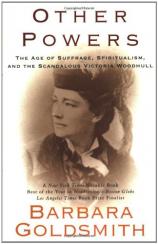Reading Group Guide
Discussion Questions
Other Powers

1. How does knowledge of events that occurred during Victoria Woodhull's lifetime, even if she was not directly involved in them, help to explain her life and her actions? How does her life illuminate connections between events and people that, on the surface, seem unrelated?
2. What elements of Spiritualism attracted women's rights advocates? Why might later historians of these advocates have omitted the relationship between the two movements? What is the value of bringing that relationship to light?
3. Goldsmith states in the Introduction that "in many of the books I read, particularly of the period [of Other Powers], important material that revealed the actual character of these people had been expurgated." What information does Goldsmith include that corrects that amputation of essential elements of Woodhull's character by other biographers? Who besides Woodhull does Goldsmith flesh out and in what ways?
4. The dramatic 1869 American Equal Rights Association meeting occurs approximately half-way through the book. What simmering tensions came to the surface during that meeting? Why was this event a turning point for the woman's movement? Did the end result of this meeting ease the way for Elizabeth Cady Stanton to associate herself and her cause with Woodhull? What tensions did that association cause?
5. Woodhull had a complicated relationship with her unusual, unpredictable family. Did her unorthodox upbringing help her to succeed? How did her family hinder her? What are reasons the family might have stayed so close despite the problems they caused each other?
6. Goldsmith writes that "this was an age in which men were free to treat women with the same detached cruelty as they did their slaves." In what ways can the analogy between white women and slaves, both men and women, help illuminate the state women lived in during this time? What are the limitations of this comparison? What problems did the connection between white women and black men cause in the suffrage movement?
7. Woodhull seems at times simultaneously idealistic and opportunistic. How did these two elements of her personality relate to each other? What role did each play in her decision to expose Henry Ward Beecher's affair?
8. In her introduction, Goldsmith draws a parallel between the sexual and political scandals and trials of the 1990s and those she wrote of in the nineteenth century. How does knowledge of these earlier events inform an understanding of the contemporary era and its scandals?
Other Powers
- Publication Date: March 24, 1999
- Paperback: 560 pages
- Publisher: Harper Perennial
- ISBN-10: 0060953322
- ISBN-13: 9780060953324







